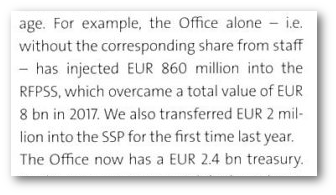

SEVERAL months ago EPO insiders complained that the EPO had morphed from a service (monopolised even) into an "investment bank". It's actually a hefty tax on Europe. It's a large repository of cash which is often misused (it lacks transparency), e.g. to bribe media, allegedly 'buy' votes, SLAPP bloggers, corrupt academia and generally serve as the private cash cow of few top-level officials. It's just so ripe for corruption. Some of Battistelli's own loyalists have been put in charge of the budget -- clearly a recipe for disaster after Battistelli abolished auditory functions.
"And where does all that money end up other than Battistelli's town, penthouse, platoon of private bodyguards, bonuses and so on?"The EPO does not lack money; it's taxing the public and it has virtually no competition in Europe. But what it 'delivers', namely patents, can cost the public many billions (lawsuits, i.e. legal fees). If the economists at the EPO weren't Battistelli loyalists, maybe they'd speak out about this again. The former Chief Economist of the EPO warned that Battistelli's implicit policy of lowering patent quality (for the sake of quantity) would bring patent trolls to Europe -- something which is already happening. It's like printing/minting far too much money; it's economically absurd to do so.
"It's like printing/minting far too much money; it's economically absurd to do so."It's with that in mind that we share or express great concern*. And where does all that money end up other than Battistelli's town, penthouse, platoon of private bodyguards, bonuses and so on? It certainly looks like EPO staff, i.e. people who actually do all the work, faces cuts. Battistelli receives over half a million euros in yet another bonus, whereas examiners need to accept cuts?
There are, according to staff representatives, only 3 days left to appeal some of these cuts. "Defend your NPS/SSP rights," the representatives urged, "by 25 April" (that's Wednesday).
Citing the relevant PDFs [1, 2, 3] and this editable form, they warn that "[a]mended contribution rates to the NPS / SSP harm staff recruited after 2009" and add:
The President has amended the contribution rates to the NPS and to the SSP several times since 2009. The last amendment has taken place with effect from 1 January 2018, on the basis of an actuarial study (CA/61/17) and the Office comments (CA/62/17).
With CA/D 11/17, the Administrative Council modified Article 41(1) of the Old Pension Scheme (OPS) and set the contribution rate of the employees to 9.8%. With Circular 389 replacing Circular 349, the global contribution rate to the NPS and SSP was raised from 29.1% to 29.4%. The contribution rate to the NPS was increased by the President from 22.5% to 24.9% and the contribution rate to the SSP was decreased from 6.6% to 4.5% with effect from 1 January 2018.
The above decisions harm colleagues in the NPS in that especially the contribution rate to the SSP is substantially decreased and therefore the amount paid to the SSP every month into the SSP is substantially lower and will result in a smaller accumulated amount over the years.